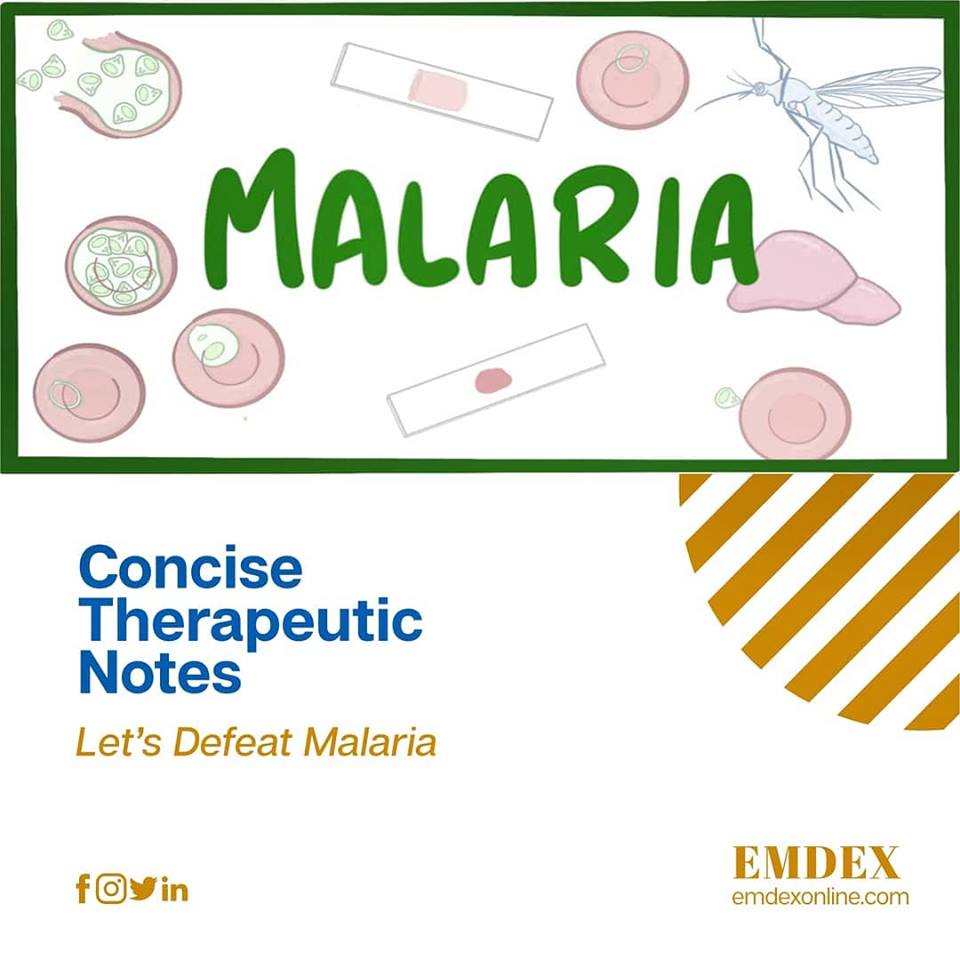Excerpts from Nigeria’s National Guidelines for Diagnosis and Treatment of Malaria (FMOH, 2015) & WHO Guidelines for the Treatment of Malaria 2015
DIAGNOSIS
Prompt parasitological diagnosis by microscopy or rapid diagnostic tests (RDTs) is required in all patients suspected of malaria before treatment.
TREATMENT OF UNCOMPLICATED P. FALCIPARUM MALARIA
Artemisinin-based combination therapy (ACT) is recommended as first-line curative treatment for uncomplicated P. falciparum malaria and should be given for at least 3 days. For maximum benefit, ACTs should be administered within 24-48 hours of the onset of malaria symptoms
Artemether-Lumefantrine (AL) is medicine of choice with Artesunate-Amodiaquine (AS-AQ) as alternate
Avoid monotherapy, it promotes resistance. Artemisinin and its derivatives should not be used as monotherapy for uncomplicated malaria. They are rapid-acting and if used alone, can lead to development of drug resistance. Nigeria has banned all oral artemisinin-based monotherapies (oAMT) since 2009.
Chloroquine and Sulfadoxine-Pyrimethamine are no longer recommended for the treatment of malaria in Nigeria due to the prevailing high levels of resistance which have compromised their efficacy even in combinations.
Antipyretic measures are recommended for fever ≥38.5°C (101.3°F) using Paracetamol; tepid sponging is also advised for children.
MANAGING MALARIA IN SPECIAL POPULATIONS

In the second and third trimesters, ACT (AL or AS-AQ) is the first-line treatment for uncomplicated P. falciparum malaria

Treat infants weighing <5 kg with uncomplicated P. falciparum malaria with an ACT at the same mg/kg bw target dose as for children weighing 5 kg; under supervision by a health care provider.
SEVERE MALARIA
Severe malaria is a medical emergency. The recommended first-line treatment for severe P. falciparum malaria is IV Artesunate. If parenteral Artesunate is not available, IM Arthemeter or IV/IM Quinine may be used as alternatives.
Severe malaria must be treated parenterally for minimum of 24 hours, irrespective of patient being able to tolerate oral medication earlier. Treatment is completed by giving a full 3-day course of ACT.
In treating severe malaria, children weighing ≤20 kg should receive a higher dose of artesunate (3 mg/kg bw per dose) than larger children and adults (2.4 mg/kg bw per dose) to ensure equivalent exposure to the drug
In pregnancy, the first-line treatment for severe malaria is IV Artesunate
Pre-referral treatment of severe malaria and prompt referral are recommended at the community or peripheral health facilities. The treatment options in order of preference include:
- For children: artesunate IM; or rectal artesunate; or artemether IM; or quinine IM;
- For adults: artesunate IM; or artemether IM; or quinine IM
CHEMOPREVENTION AND CHEMOPROPHYLAXIS OF MALARIA
Sulfadoxine-pyrimethamine can be used for intermittent preventive treatment of malaria in pregnant women (IPTp). SP should be given twice in pregnancy separated by at least 4 weeks, 1st dose to be given from 16 weeks of pregnancy. SP must not be used in 1st trimester of pregnancy. The guideline recommends that since SP is an anti-folate, high dose folic acid should be withheld for one week after SP administration
The recommended chemoprophylaxis for non-immune visitors to Nigeria is: Mefloquine and Atovaquone-Proguanil. Doses should be taken prior to arrival in Nigeria and continued during the stay and following departure from the country.
Malaria can precipitate crises in sickle-cell disease. Recommended treatment is ACTs and prevention is by vector control measures such as LLINs (long-lasting insecticidal nets).
Seasonal malaria chemoprevention (SMC) is defined as the intermittent administration of full treatment courses of an antimalarial medicine during the malaria season to prevent malarial illness by maintaining therapeutic antimalarial drug concentrations in the blood throughout the period of greatest malarial risk. WHO recommends SMC for children aged 3 to 59 months living in areas of high seasonal malaria transmission. In Nigeria, SMC is recommended in States like Kebbi, Sokoto, Zamfara, Katsina, Kano, Jigawa, Bauchi, Yobe and Borno.
Long-lasting insecticidal nets (LLINs): sleeping under insecticide-treated nets to prevent infectious mosquito bites.
Indoor Residual Spraying (IRS): indoor application of long-lasting chemical insecticides to kill malarious mosquitoes
Further reading:
- Nigeria 2015 National Guidelines for Diagnosis and Treatment of Malaria May 2015.pdf [Internet]. [cited 2018 Jul 25]. Available from: https://www.severemalaria.org/sites/mmv-smo/files/content/attachments/2017-02-06/Nigeria%202015%20National%20Guidelines%20for%20Diagnosis%20and%20Treatment%20of%20%20Malaria%20%20%20May%202015.pdf
- WHO Guidelines for the Treatment of Malaria, 3rd Edition [Internet]. [cited 2018 Jul 20]. Available from: http://apps.who.int/iris/bitstream/handle/10665/162441/9789241549127_eng.pdf?sequence=1

